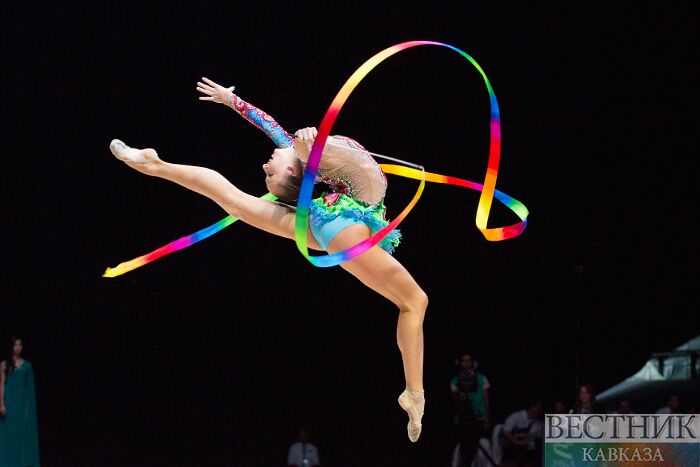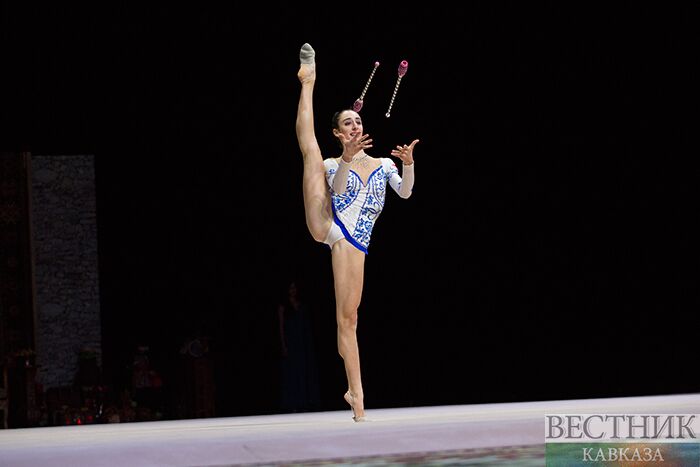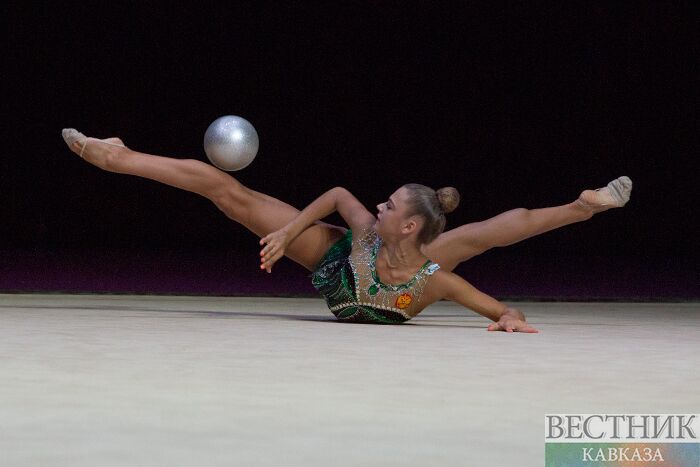Baku is hosting the Intercontinental judges' course in rhythmic gymnastics, which are attended by 115 judges from 46 countries. This event is held every four years, at the beginning of the Olympic cycle, and this time the organizers - the International Gymnastics Federation (FIG) - entrusted it to Baku. The President of the FIG Rhythmic Gymnastics Technical Committee, Natalya Kuzmina, told Vestnik Kavkaza about the main trends of development of rhythmic gymnastics in Azerbaijan and in the world.
- Azerbaijan is one of the few countries where gymnastics began to develop rapidly. Is it possible to consider Azerbaijan's model of the development of gymnastics as an example for other countries?
- I think yes. There are traditions in Azerbaijan, excellent results have been achieved. There is a very good leadership, which understands and loves gymnastics, there are many talented coaches, choreographers, directors, which help in sports schools, clubs. So, of course, it is an example for other countries. I hope that the Azerbaijani gymnasts will show good results in this Olympic cycle, because the stage is set for this. Unfortunately, I has never seen the Olympic Gymnastic Center [National gymnastics arena - VK], but I've heard a lot about this unique construction, which, of course, also contributes to the development of this sport. The main thing is that the audience in Azerbaijan love gymnastics, as far as I could see and hear at all the world championships: such an attitude also promotes the development.
- Why was Baku selected for the Intercontinental judges' course in rhythmic gymnastics?
- We know that Azerbaijan is a very good conductor of all activities, not only of judges' courses. It is a very strong composition of the Federation [of gymnastics of Azerbaijan], which has extensive experience in organizing any type of event and can hold any high-level competition. The International Gymnastics Federation announced a competition for the right to host the Intercontinental course. This contest has won by Azerbaijan. We are satisfied, because good conditions were created.

- What is the purpose of the judges' course, which are being held in Baku?
- The course is traditionally held at the beginning of an Olympic cycle, because they change requirements and competition rules. Now the system of judging changed, and judges need new knowledge. Now they will not use the official form in which coaches indicate in advance which elements will be performed by gymnasts. Judges will judge "online", fix what they see and evaluate these elements at once. The system has been modified for greater objectification of refereeing. Many criticized the old system, sometimes not realizing that 60% of the time a judge looks at icons and does not see a gymnast's performance. Here is another downside: for example, a gymnast announced her elements, but at the moment, at this competition she is not feeling well, and she cannot miss the element and perform another one. But it will not work because she must perform exactly those elements, which are fixed in the application. It was not in favor of gymnasts. The new system is already applied in gymnastics, and it will benefit rhythmic gymnastics. After the course a judge will pass the exam and receive a license, obtain a judging category in order to judge all the remaining four years and fight for the right to judge at the Olympic Games.

- What are your expectations for this course? In recent years, there are different discussions about facilitating the rules of rhythmic gymnastics ...
- I do not think one can talk about facilitation of the rules, because rhythmic gymnastics is a sport. In order to remain an Olympic sport, there should be very strict rules, high standards, otherwise it will simply be removed from the Olympic program, because the competition is very high. The purpose of the course is firstly, objectifying the refereeing, and secondly, helping the judges to give a clear and precise criteria and clear interpretation of the competition rules. In addition, we tried to make the rules more universal for anyone who wants to compete in rhythmic gymnastics - not only, for example, for Russian or Azerbaijani gymnasts, but that we can have representatives from Asia, Africa and the US. Now gymnastics is being developed on the fifth continent - Oceania.
- Geography is expanding, but there are still the same countries in the final stages. How to give way to beginners?
- We are making great efforts to this. The finals of the World Cup, the World Championships necessarily involve three continents. There are three continents even on the podium, as a rule. Asia, Latin America, Canada, the US have improved very strongly. We have reviewed some of the requirements in order not only those gymnasts which can control their bodies, perform complex elements, which have a strong tradition of ballet or gymnastics and other gymnastics, could get high scores, but also representatives of those countries, where, for example, a girl can manipulate a subject very well. That is, not only the work the body will be assessed, but also complex coordination elements using a subject, as well as the connection of all the elements with a body, with a subject, with music. It is important to create a composition, which will be not just a set of elements and difficulties, but a real choreographic miniature with an idea, development of the plot, which implies very close ties between music and movements. For example, those gymnasts from Africa, which cannot perform complex elements with their bodies, but can use a subject, will receive a higher rating in this part of the difficulty. Or, for example, by performing dance steps, which are also assessed, have many different requirements, can thereby improve their assessment. In this exact direction we are improving the rules. At the same time a lot of work is carried out to help trainers, choreographers. Gymnasts from other continents come to Azerbaijan for joint exercises. Coaches in Azerbaijan are very talented, they pass on their skills. We try to get powerful countries to help others to reach a higher level and compete.

- How to avoid personal interpretations of certain episodes or elements by judges?
- They should explain trainers, hold seminars, give clear recommendations, improve all of the documents for judges. I am not a supporter of repressive measures. Of course, if a referee made a mistake, he should be punished. Still FIG should not go on this way, but should carry out educational activities, give the knowledge and experience which a judge must acquire to be able to judge.
- What are your plans for the near future?
- The Intercontinental course is opening a series of other courses. They are major, a judge can get the highest category - the first or second - only at the Intercontinental course. He can get the third or the fourth, or even fail. But the highest, the first category, one can only get at this course. The next are the international courses on linguistic grounds. Baku will host a course in English, Moscow - a course in Russian, and then thee will be courses in French, again in English in Europe, in the US, in Asia and in New Zealand - until May. At these courses, one can get all the other categories, except the first one. If a judge did not get the desired estimate, he can retake again in other international courses. Already after May the courses in national federations will start. A country can say: we want to hold courses for our judges. There they will receive only the lower, the fourth category, and then, in the course of practical judging of all international competitions they will gain experience in order to either upgrade their level or qualify to judge at other competitions and so on. Then there will be the first World Cups and the first World Championships, which will be in the fall. Therefore, the Intercontinental course, which are being held in Baku, is very important.






